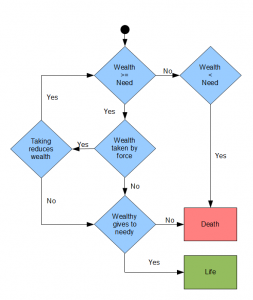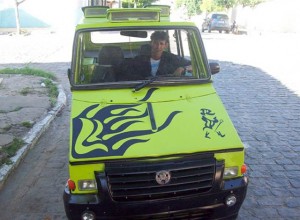Peer-to-Peer Learning Disrupting Poverty
I’ve been promoting peer-to-peer technology and education for 15 years. USA is ignoring the advice, India is doing it and succeeding.
http://www.wired.co.uk/magazine/archive/2011/04/features/disrupting-poverty?page=all
Michigan is complaining that it can’t cut spending below $7316 per student per year for 12 years but India is able to train engineers in 6 months for nearly free and teenager Babar Ali is providing elementary education for free using the peer-to-peer model. http://news.bbc.co.uk/2/hi/8299780.stm
More importantly the people actually getting it done are avoiding the top-down hierarchies of established charities and government. They are doing it themselves and helping others to also do it themselves.
Force, Charity and Logic
 Some people claim wealthy people must be forced to provide for the needy. Logic and evidence show that is false. Charity is always freely given, and that is often.
Some people claim wealthy people must be forced to provide for the needy. Logic and evidence show that is false. Charity is always freely given, and that is often.
This flow chart shows both freely given charity and forced redistribution of wealth. Before we begin what is “needy”. A person is needy if they do not have the items to maintain their natural life. So far human technology is not capable of eternal life, regardless of the amount of physical wealth.
We are all needy at some point. When we are born we are not able to provide for ourselves what we need to continue our lives. So all of us were needy and had that need filled by someone else at some point in our lives. How did that process of being needy and someone deciding to give us what we need work?
Step 1, is the total wealth more than or equal to the total need? That means is there any extra to go around? If there isn’t any extra to go around it doesn’t matter, someone will die. It might be the needy or someone else who becomes needy by giving what they have to someone else. If there isn’t enough for everyone to live then someone dies. If possible we want to avoid that at all costs.
If there is extra there is a choice, is the wealth taken by force? If that happens there is now a new wealthy person. The person who took the wealth is now wealthy. Additionally, taking the wealth by force might reduce the wealth. Fighting to take something from someone who doesn’t want to give it requires some energy and frequently breaking things including killing someone. Just for argument sake we will assume there is also a way to forcibly take wealth from someone without spending any wealth in the process.
If taking the wealth by force reduced the wealth there is a possibility there is now not enough to go around. That is very common. Civil wars in particular leave many people in poverty and starving even if the nation was prosperous before the fighting.
Assuming taking the wealth by force does not reduce the wealth leaves us at the same point as if no force had been used. The original owner of the wealth or the new owner who took it by force decides to give the wealth to the needy or keep it. So it doesn’t matter if force was used or not. The life and death of the needy still depends on the free choice of the wealthy person.
The logic shows that charity is always freely given.
People who argue for using force says, “I’m afraid wealthy people won’t give to the needy. There is no guarantee.” That is absolutely correct. There is no guarantee. There isn’t any guarantee without force and there isn’t any guarantee with force.
As long as there is anyone who is needy, it is impossible to guarantee their needs will be provided. We’ve already shown that using force to redistribute wealth has the risk of decreasing the wealth and making the needy worse off. The solution to the problem of the needy is to create more wealth.
So the logic shows there are two ways to provide for the needy, freely given charity, and increased wealth. Does the evidence agree with the logic? Yes!
The nations with the largest number of needy people, the highest percentage of needy people, and the deepest need are those that are overall the poorest. The wealthiest nations have no truly needy people. There might be people with drastically less wealth than others but except for people willfully rejecting food or shelter there are no starving people in the industrialized nations.
The individuals of wealthy nations either have many opportunities to acquire their own wealth by trade, working the soil, or gifts. There are even people who call themselves Freegans who choose to live from things discarded by others and Freedans claim to live quite well. Freeganism is not to be confused with impoverished people struggling to subsist scrounging from dumps. It’s worth pointing out that one of the reasons there is so much for Freegans to pull out of dumpsters is because of government forced waste.
Wealthy nations also give amazing levels of charity. In the USA the amount of charitable giving $295 billion exceeds the amount of federal government tax funded welfare $254.2 billion.
Not only do people give to charities to help the needy, they also donate to fund projects they like. Contributions to make a movie about the making of the video game Minecraft raised $60,000 more than the $150,000 they requested.
Monetary giving isn’t the only form of charity. Millions of people donate food, and labor to organized charities and directly to individuals. This is over and beyond the monetary giving.
So we can see that the logic proves and the evidence confirms that charity is freely given.
One man and a pile of junk ends poverty

Orismar de Souza, a homeless man in Brazil, built a car using junk, spare parts and a hammer and chisel. Four years later, the “shrimpmobile” has him back on his feet.
http://www.msnbc.msn.com/id/42329229/ns/technology_and_science-tech_and_gadgets/
This story mirrors the story of my great grandfather, James Dodd. He had worked as a coal miner since he was 8 years old to support his mother and siblings. During the great depression he and a friend built a motorcycle from spare parts and road to Detroit to find work in the factories. They left their wives and children behind and when they got to Detroit had to camp out waiting to find work. Remember, at the time there were barely any paved roads. They had to ride through the mountains of Pennsylvania, across Ohio and into Michigan on a single motorcycle they built from junk.
They had to camp for a month before they could get work. They then saved money and sent for there wives and children to join them. At one point my great grandfather had not eaten for a week. When the women who had been renting a room to him found out she offered him food. He insisted that he would not accept charity and instead did work on the house in exchange for meals.
At one point while working in the factory his job was to test alternators. he would put the bad alternators in a box. He arranged to buy the bad ones then at night in his kitchen he would repair them and sell the re-manufactured alternators to repair shops and people fixing their own cars. He eventually quit the job at the factory and was running his own business.
He invested the money from the alternator business into fixing up and renting houses. At one point he had an entire neighborhood with a grocery store which he would allow his tenets with children who had trouble paying the bills to owe him for food until they could find work. The one rule he had was that they had their children ready to go to church which he would drive them them to in the school bus he bought.
When he died the procession of people who attended his funeral was over a mile long. He touched thousands of people’s lives and it all started from a pile a junk.



 Predictive Innovation Training
Predictive Innovation Training Predictive Innovation: Core Skills Book
Predictive Innovation: Core Skills Book RoundSquareTriangle.com
RoundSquareTriangle.com